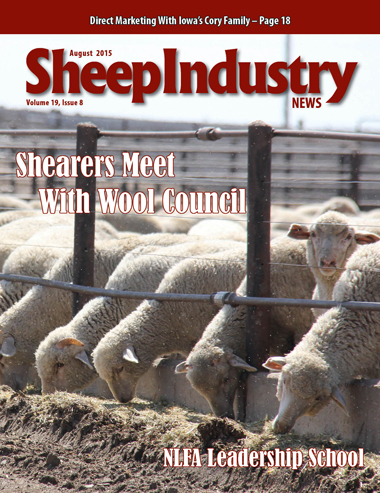To View the August 2015 Digital Issue — Click Here

Continuing Battles For The Sheep Industry
Burton Pfliger, ASI President
As summertime lingers upon us and we prepare for the fall lamb marketing season so do a few issues linger over the legislative agenda of sheep producers across the country. The Department of labor H-2A rule has “gone dark” as they say in Washington, D.C. No comments, public statements or personal conversations are being shared with your ASI leadership or Cornerstone Government Affairs. The other issue with some activity is Congressional authorization to keep the U.S. Sheep Experiment Station operational for another year.
But there’s still work to be done on both of these critically important issues.
This is your opportunity to once again contact your legislative leaders and share with them the need and importance of a fair and common sense H-2A ruling. The H-2A program with special provisions has served sheep ranchers, rural economies, rural communities and a legal, immigrant sheep herding labor force well for more than 50 years. Many of these herders return year after year for as many as 20 years. Each returns because of the opportunities and financial gains not found in their homelands, filling positions that simply won’t be filled by an American workforce.
This legal, well-documented program is good for consumers, as well as providing an abundant supply of wool and fresh American lamb protein at a reasonable price. In recent years, there has been a lot of talk about USDA’s focus program of “know your farmer” and “local foods.” How much more local can it be when fiber and food is born, raised and consumed right here in the United States of America.
The other unresolved issue is the USDA’s Agricultural Research Service attempts to close the USSES in Dubois, Idaho. The first attempt, last November, was narrowly averted. Since that time, 37 members of Congress have stood up to be counted with your encouragement. But the station is still under attack and in very real danger of shutting its doors.
Congressman Mike Simpson of Idaho, who is working with Oregon Congressman Greg Walden and other western representatives to prevent closure of the facility, recently urged the chairman of the House Agriculture Appropriations Subcommittee to deny a request by the ARS to reprogram funds from the sheep station, which would result in its closure. Simpson was pleased to learn that the request has been denied.
Simpson also sent a letter to Secretary of Agriculture Tom Vilsack expressing disappointment that neither the USDA nor ARS notified Congress of their intent to close the Dubois center. In the letter, Simpson and other western members of Congress expressed concern that neither agency has explained how research currently underway in Dubois would be continued.
Your continued efforts to plead the case on behalf of more than 79,000 sheep producing farmers and ranchers is still very much needed on both of these topics. Please, reach out to your local representatives and express the importance of these issues to those of us in the sheep industry.
As I write this, I’m returning from a trip to Dixon, Calif., where Superior Farms held a ribbon cutting at the new state of the art lamb processing facility in early July. I was privileged to attend and represent the producer members of ASI. While the plant is not yet operational, we were given a guided tour of the interior. The lamb processing chain was still being installed by German workman.
Part of the new line will be the long-awaited instrument grading system. The new line was said to have nine less contact points with human interaction. Computers will sort and store lambs based on the new instrument grading system and other customer needs expressed to Superior Farms. Congratulations to Superior Farms on a new facility and thank you for your investment in the future of American sheep producers.
While in California my wife and I took the time to visit the operation of fellow Executive Board member Joe Pozzi. Joe and Amy run a large sheep and wool business that utilizes 4,000 head of grass fed lambs which are marketed thru Whole Foods. The wool side of the business utilizes the wool from 200 other ranchers in the area and produces a variety of household natural wool products from bed pillows, dryer fabric softener balls to dishware draining mats, all marketed under the Sonoma Wool Company. It is always fun and exciting to observe and learn from other innovative producers. If you are ever in the area, stop and see Joe and Amy, they are very gracious hosts.
After a brief stop at home that included putting up hay, my travel plans called for a trip to Texas where the ASI Executive Board was scheduled to hold its summer meeting in conjunction with the 100th anniversary of the Texas Sheep and Goat Raisers’ Association at the end of July. Look for more on the Texas-style party in the September issue of the Sheep Industry News. Congratulations to Texas for 100 years of servicing your producers.


